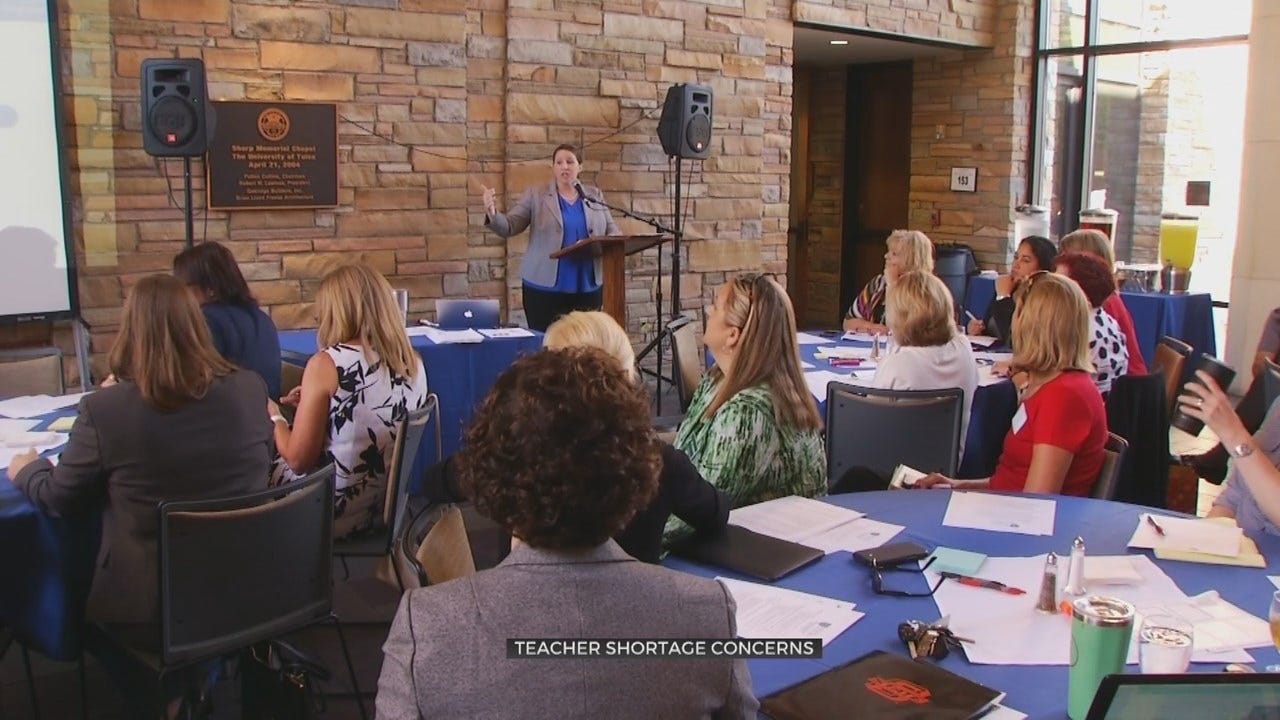Number Of Emergency Certified Teachers Causes Worry For Oklahoma Educators
As kids head back to the classroom, Oklahoma’s education problems are once again top of mind.Monday, August 12th 2019, 8:11 pm
As kids head back to the classroom, Oklahoma’s education problems are once again top of mind. Many education leaders are concerned about the number of emergency certified teachers in the state.
Now some lawmakers and educators are teaming up to try to solve this problem for future generations.
For the last school year, there were more than 3,000 emergency certified teachers approved to teach in Oklahoma and experts fear that number could be even higher for this school year.
Emergency certification allows people to start teaching in public school classrooms without having background or course work in the content area they are teaching.
The only requirement is a bachelor’s degree, but emergency certified teachers can go on to get their alternative certification or become fully certified.
"The teacher shortage has led to a teacher prep problem and now we have two problems that we have to address,” said retired Durant teacher Jon Hazell.
Hazell taught at Durant High School for 37 years. He was also named Oklahoma Teacher of the Year in 2017.
He said a lot of things have changed since he first started teaching, like the needs of students and having adequately prepared teachers to address those needs.
“As much as I love my kids and I do the best that I can, I can’t be a teacher, mom, dad, counselor, social worker and be effective at any one of them because I’m being stretched too far,” said Hazell. “When so many things are going on at home or outside of the classroom, sometimes it’s tough to find a kid who even cares where they get an education from.”
The State Department of Education said 3 out of 4 new teachers are emergency certified, and while fellow educators are thankful for those who have stepped up to help, they want to be surrounded by more certified teachers to increase retention among co-workers.
While emergency certification played a necessary role in staffing for Oklahoma schools, 17% of teachers who have taught for at least three years in Oklahoma say the increase in emergency certified teachers has negatively influenced how long they plan to teach in Oklahoma.
"We appreciate those people who want to step in and do that work, it’s a noble thing to do but they're not prepared,” said Hazell.
The State Department of Education said in the last few years 30,000 teachers have left Oklahoma and 3 out of 4 new teachers are emergency certified.
University of Tulsa Department of Education Chair Elizabeth Smith said that statistic is alarming when there's only 40,000 teachers in the state.
“It’s not like we don’t have enough teachers or that we have a teacher shortage,” said Smith. “It’s that we've created the conditions that they don’t want to work in.”
Smith said even with the teacher pay raise, it’s still difficult to find teachers who want to teach in Oklahoma because of the lack in classroom funding.
“The teacher pay raise was the first step but really we need long term solutions to ensure that we have more students that plan to study education this fall so then in four years we’ll have more teachers,” said Smith.
During the conference, representatives from 12 different Oklahoma Colleges and Universities came together to discuss ideas for recruiting teachers to stay in Oklahoma.
Their hope is to recruit Oklahoma students to attend Oklahoma Universities, then in return they hope these students will stay in Oklahoma to teach.
“They'll really have the passion to work here because they're from here,” said Smith.
Some of their ideas include using state funds to provide loan forgiveness, a signing bonus for new teachers, paid student teaching internships or even paying for certification tests.
“The certification tests all together cost around $500 and sometimes it’s hard to be able to afford that as a new student,” said Smith.
Several lawmakers were on hand during the conference today and Representative John Waldron says he plans to bring up some of their ideas next session.
“I know a lot of people said we needed to put more money in the rainy-day fund than was legally required but I think the best way to prepare for a rainy day is to actually fix the roof,” said Waldron.
Even though some of these ideas are costly, it's an investment that could pay off in the long run.
"Education is not like a business. It will never show a profit on the front end. It’s always going to be expensive and its always going to look like you’re losing money but what it does is it shows the profit on the back end when those educated children come back and contribute to society,” said Hazell.
Continuing to build a strong foundation for the future of education in Oklahoma.
"We shouldn’t be in crisis mode forever; we should have a strong professional teaching core in Oklahoma," said Waldron.
Representatives from the different colleges and universities all presented how they were working to address the teacher pipeline problems at their prospective schools.
They said at this point they aren’t competing for students, instead they are working together to keep their students in Oklahoma after they graduate.
“It’s not all the time that we are all in the same room talking about the same thing so we hope to have more of these so we can continue to work towards a long-term solution collaboratively,” said Smith.
More Like This
January 2nd, 2025
September 29th, 2024
September 17th, 2024
Top Headlines
April 4th, 2025
April 3rd, 2025













